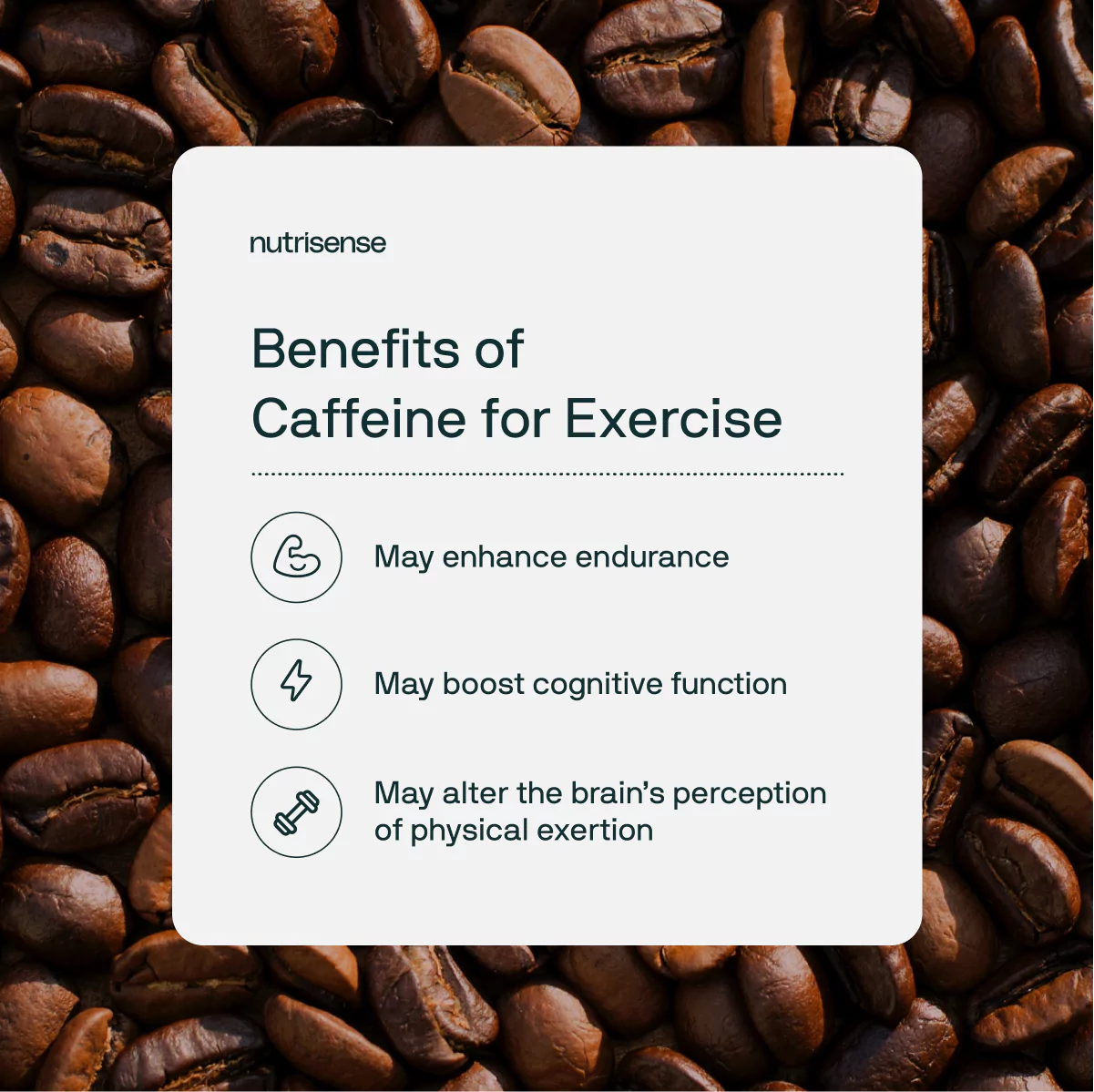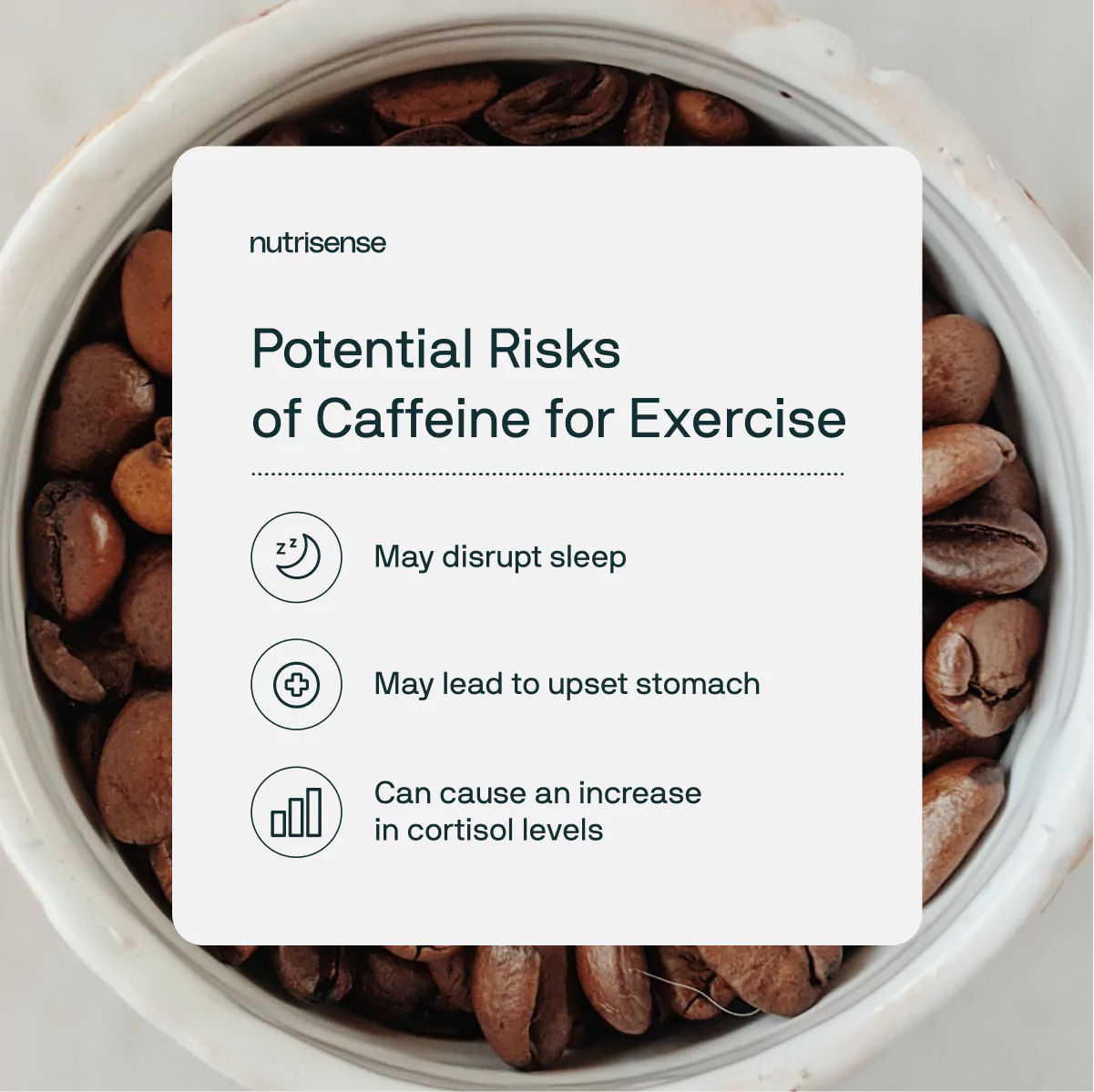The Truth About Caffeine and Exercise

Key Takeaways
For many of us, a cup of coffee or a pre-workout energy drink is an essential part of our exercise routine. We rely on caffeine to kick start our mornings, stay focused throughout the day, and even power through our workouts.
But what exactly is the impact of caffeine on exercise performance? And what amount of caffeine is too much or too little to make a positive difference?
Let’s take a deeper look into the science of caffeine and how it can boost your physical performance.
The Science Behind Caffeine

Starting with the basics: what is caffeine? Caffeine is a naturally occurring stimulant that belongs to the class of compounds known as methylxanthines. It is found in various plants, including coffee beans, tea leaves, and cacao pods.
Apart from naturally occurring caffeine found in drinks like coffee and tea, caffeine is often added to beverages like soda and energy drinks, and is also available in supplement form. This compound works by stimulating your central nervous system and acting on the adenosine receptors in your brain, helping you to feel more alert.
By blocking adenosine receptors, caffeine prevents it from exerting its usual sleep-inducing effects, leading to increased alertness and wakefulness. Numerous scientific studies have also shown that caffeine can enhance both physical and cognitive performance.
However, it's important to note that there can be a great deal of variability when it comes to the effects of caffeine. Factors such as dosage, timing, tolerance, and individual sensitivity play a significant role.
While many studies illustrate the potential cognitive and performance-enhancing effects of caffeine, some individuals may not experience the same benefits or may be more susceptible to negative side effects.
Caffeine’s Impact on Exercise Performance

So, how exactly does caffeine influence exercise? It turns out that there are a number of different potential benefits of taking caffeine before or during your workout.
According to recent research, in order to take advantage of the ergogenic effects of caffeine, or performance-enhancing benefits, experts suggest most people ingest about three to six mg of caffeine per kilogram of bodyweight.
Let's explore how caffeine influences various aspects of athletic performance, including endurance and strength activities and cognitive function while exercising.
Benefits of Caffeine for Endurance Activities
Endurance exercise, also called aerobic exercise, increases your heart rate and breathing. Here’s how pre-exercise caffeine use can affect endurance athletes during training:
- Caffeine has been shown to enhance endurance performance by mobilizing fatty acids as an alternative energy source, thereby sparing muscle glycogen. This delay in glycogen depletion can extend exercise duration and help people push through fatigue, allowing for longer, more intense workouts.
- Some research suggests that caffeine has an acute thermogenic effect during a workout, meaning it can promote fat oxidation during exercise, such as high-intensity exercise. However, this does not necessarily mean that caffeine consumption will result in greater weight loss success. Caffeine and weight loss may have a more complex relationship.
- Research suggests that caffeine can alter the brain's perception of physical exertion, making strenuous activities feel more manageable. It can also decrease the perception of pain, which could be especially beneficial during challenging workouts. However, though caffeine may reduce pain perception, exercise-induced muscle damage (EIMD) may still be present.
Effects Caffeine Has on Strength and Power-Based Exercises

Strength and power-based exercises focus on increasing muscle strength, speed, and explosiveness. Here’s how caffeine can affect strength and power-based exercises:
- Caffeine has been shown to increase the release of calcium ions within muscle cells, which play a crucial role in muscle contractions. This can lead to stronger, more forceful contractions during muscular strength exercises.
- Caffeine has the ability to reduce the perception of fatigue during exercise. This means that even when you're pushing your limits, caffeine can help make the effort feel more manageable, potentially allowing you to extend your sets or complete more challenging exercises.
- Studies suggest that caffeine consumption prior to strength exercises may reduce muscle soreness and pain post-workout. Though again, EIMD may still be present.
Caffeine and Cognitive Function While Exercising
Caffeine has a significant impact on cognitive function during exercise. Here's how caffeine affects cognitive function while exercising:
- Caffeine can increase alertness and improve focus, allowing you to maintain mental clarity and concentration during exercise.
- Research suggests that caffeine consumption can improve reaction time, making your cognitive responses quicker and more efficient during exercise.
- Caffeine can counteract the perception of fatigue during a workout by reducing the perception of effort and increasing feelings of energy, which may help you sustain mental performance for longer periods during exercise.
- Caffeine has been found to enhance the ability to switch attention between tasks, which may benefit those who participate in multiple exercises during a single workout session.
Potential Risks of Caffeine and Exercise

While caffeine offers numerous benefits for exercise performance and cognitive function, there are some potential risks of caffeine for certain people. Here are some of the potential drawbacks of using caffeine that can affect anyone, not just untrained individuals.
Potential for Sleep Disruptions
Caffeine can disrupt sleep patterns, especially when consumed in high quantities or too close to bedtime. Caffeine consumption can interfere with the natural sleep-wake cycle, and can also affect REM (rapid eye movement) sleep, which is essential for restorative rest and various cognitive functions.
Could Cause or Worsen Digestive Issues
Another potential effect of caffeine ingestion is gastrointestinal discomfort or an upset stomach. Caffeine can stimulate the production of gastric acid in the stomach, which can cause irritation, stomach pain, and possibly heartburn.
Some studies also point out a possible worsening of irritable bowel syndrome (IBS) with caffeine consumption.
Caffeine can also accelerate the movement of food through the digestive tract by increasing gastric motility. While this can be beneficial for some individuals, it may cause gastrointestinal distress, especially if caffeine intake is excessive or consumed on an empty stomach.
Increased Cortisol Release
Some studies show that using caffeine during exercise can lead to elevated levels of cortisol, the body’s primary stress hormone. Chronically elevated cortisol levels can have negative effects on the body, including the potential for higher glucose levels.
Does Caffeine Help With Fat Loss?
There is some limited and controversial evidence to suggest that the use of caffeine might be beneficial for weight loss. Some research shows that drinking caffeine before a meal may reduce both calorie intake and appetite in the short-term. However, the relationship between caffeine and weight loss may not be so straightforward.
Low doses of caffeine may also influence energy balance in the body, and promote thermogenesis, which might impact body weight. On the other hand, if caffeine is negatively impacting cortisol or other aspects of metabolism such as sleep and digestion, its positive impact on your overall metabolic health and weight may be questionable.
Different dietary and exercise factors can also play a role in fat loss. For more on the differences between weight loss and fat loss, check out our article on weight loss stages here.
Popular Caffeine Sources for Exercise

Whether you prefer traditional beverages or seek alternative options, there is likely a caffeinated drink you can enjoy if you’re looking to improve sports performance. Here are a few popular sources of caffeine:
- Coffee
- Black, white, green, or oolong tea
- Energy drinks and gels
- Pre-workout supplements
- Dark chocolate
- Caffeine-enhanced chewing gum
- Caffeine supplements
If you want to try caffeine supplementation to improve your cycling performance, running performance, or performance in other types of training, you may consider choosing one of these sources that aligns with your personal preferences and tolerance.
It’s important to remember that moderation is key, as excessive caffeine intake can lead to negative effects. Some people may find they are sensitive or intolerant to even small amounts of caffeine. You may want to consult with a healthcare professional or qualified nutritionist for personalized recommendations based on your specific needs and goals.
Can You Safely Supplement with Caffeine?

While caffeine may have potential performance-enhancing benefits, it is not a substitute for proper training, good nutrition, and good hydration. It is just one factor to consider in an overall healthy and balanced workout routine.
If you would like to try supplementing caffeine for its potential performance benefits, safety is key. Here are some guidelines to consider:
Gradually Increase Your Intake
If you are not accustomed to consuming caffeine regularly, you may want to start with a lower dose and gradually increase it over time. This allows your body to adjust and helps you gauge your tolerance and sensitivity to caffeine.
Know Your Limits
Everyone's tolerance to caffeine varies, so it is important to be aware of your individual limits. Pay attention to how your body responds to caffeine and be mindful of any signs of discomfort, such as jitters, rapid heart rate, digestive upset, or sleep disturbances. If you experience these symptoms, it may be an indication that you have reached your personal threshold.
Timing is Important

Consider the timing of your caffeine intake. As mentioned earlier, consuming caffeine too close to bedtime can interfere with sleep quality and disrupt your natural sleep-wake cycle. It is generally recommended to avoid caffeine intake within a few hours of bedtime to ensure adequate rest.
Seek Professional Advice
If you have any underlying health conditions or concerns, it is always a good idea to consult with a healthcare professional who is certified sports nutrition or registered dietitian, before making significant changes to your caffeine intake. They can provide personalized guidance based on your specific needs and help ensure you approach caffeine consumption safely and responsibly.
Find the right Nutrisense programto turn insight into progress.
Go Beyond Glucose Data with Nutrisense
Your glucose can significantly impact how your body feels and functions. That’s why stable levels are an important factor in supporting overall wellbeing. But viewing glucose isn't enough. Nutrisense, you’ll be able to learn how to use your body's data to make informed lifestyle choices that support healthy living.
One-to-one coaching
Sign up to access insurance-covered video calls to work with a glucose expert: a personal registered dietitian or certified nutritionist who will help tailor your lifestyle and diet to your goals.
Monitor and measure what matters
With the Nutrisense CGM Program, you can monitor your glucose with health tech like glucose biosensors and continuous glucose monitor (CGM)s, and analyze the trends over time with the Nutrisense App. This will help you make the most informed choices about the foods you consume and their impact on your health.
Find your best fit
Ready to take the first step? Start with our quiz to find the right Nutrisense program to help you take control.

Heather is a Registered and Licensed Dietitian Nutritionist (RDN, LDN), subject matter expert, and technical writer, with a master's degree in nutrition science from Bastyr University. She has a specialty in neuroendocrinology and has been working in the field of nutrition—including nutrition research, education, medical writing, and clinical integrative and functional nutrition—for over 15 years.

.webp)


